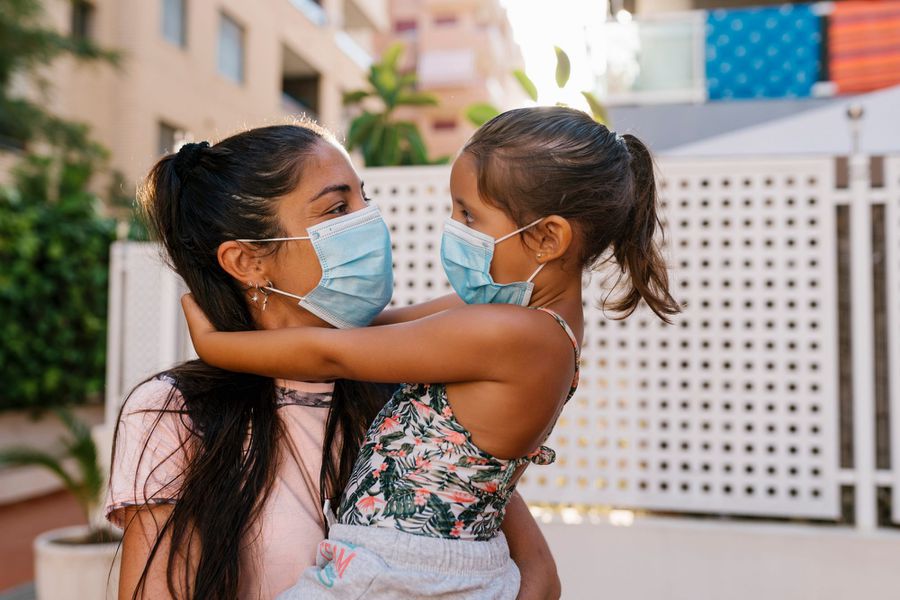
It’s been a crazy few years. Just when you think the pandemic is in our collective rear-view mirror, you hear that there’s a new variant of the coronavirus, and it’s rumored to be more serious for children. Or that young kids have to wait a little longer for the vaccine. What’s next? you wonder.
You aren't the only one. After learning how to wear masks, and dealing with canceled playdates, stay-at-home orders, and school closures, our kids have grown understandably fatigued by COVID-19 news. It's hard for parents to really understand the incalculable weight the pandemic has put on young children, especially those who are so little that they don't remember life before it started.
We have yet to define what sort of chronic stress our children are experiencing due to the apparent randomness of change in their universe. We do know that high levels of toxic stress in childhood can impair academic performance; that it is linked to alcoholism, depression, eating disorders, heart disease, even cancer. We know that when kids wore masks to school they missed seeing pals’ faces.
But here’s what else we know. We know that having a positive, nurturing relationship with a parent or other adults cuts the risk of long-term problems from toxic stress nearly in half. In fact, researchers in an important 2019 study found that the effects of adverse events in childhood “may be partially or fully moderated by the presence of an adult who makes a child feel safe, by having adequate social support in the form of a loving, stable adult, or by living in a safe, supportive neighborhood.”
Of course, knowing what to say to kids about COVID-19 puts a lot of pressure on parents. And kids may not always seem interested in outside news. It's developmentally normal for them to care about things right in front of them and be self-focused. One thing is for sure, though: They will have a greater sense of safety and security if you keep connecting with them, explain things (appropriately) when asked, and help them process and understand changes in their immediate environment.
When you talk to your children about COVID-19, try using a "check-in sandwich." Start by discussing something positive and specific, then explore more difficult issues while addressing questions and concerns. End by making statements that reinforce your kids' safety. Here are the steps in detail.
1. Accentuate the Positive
Kids want to know that you've noticed them. Pick something concrete they've done that you can shine a light on. Do you feel proud of their efforts at school, the creative ways they've reconnected with friends, or how they adhered to changing rules? Mentioning these things gets your child's attention, reinforces your connection, and emphasizes a strength your child can use in future to cope. Highlight their inquisitive nature, kindness, or diligence, and point out how it has helped them so far.
2. Share Your Truths
When children know something is wrong, but don’t know exactly what, their imagination runs wild. It makes them feel even worse—uncertain and unsafe. You can tell them what’s wrong while keeping it age-appropriate. “Thousands of people are getting vaccinated every day, but many people are still sick and spreading the virus,” for example. Acknowledge uncertainty, but spotlight the positive too.
To get them talking, ask open-ended questions like, "Do you have any questions about the virus?" or "What have your friends said about vaccines?" If they still clam up, you might share what's on your mind. "It's been tricky helping you with school while working from home, but I'm doing my best. It's so nice we can have lunch together." Or, "I get worried sometimes myself. Going for a walk helps me feel better." If kids have a lot of questions, it's OK to say, "I don't know, but I can try to find out for you."
3. Make Them Feel Safe
You can say something like, "I know it's a strange time, but so many people are out there working to make things better. You know I am always here for you and so are [other supportive people]. If you ever have questions or feel worried, you can always ask me. I promise we will get through this together."
Even if you’re not up on the latest news about the pandemic, it’s quite likely that you are much better informed than your child. Keeping them in the loop can remind them they are safe—and there’s almost nothing more important to a child’s mental health than letting them know they are cared for and safe.
Above All, Just Be There
No luck talking about world events? It's OK if your attempts at a COVID-19 check-in don't go well. Just getting into the habit of having an open dialogue with your child will encourage them to start opening up, too. It's also perfectly appropriate to take your cues from your kids. If they don't seem open to discussing things today, it may be that another time or place is better. Or maybe they don't need to check in as often as you think! Remember: Simply being there for your child is enough.
Kelly Fradin, M.D., is a pediatrician and author of Parenting in a Pandemic: How To Help Your Family Through COVID-19.
